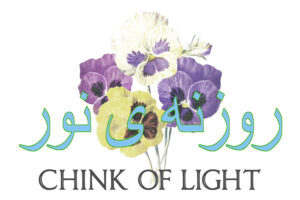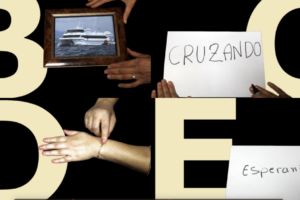Karima is a poet and artist, working with the mediums of calligraphy, textile and collage. Now based in Brussels, she will present the book and the expo Chink of Light that she made together with her siblings while fleeing for an uncertain future far from home.
Karima’s family is of Tajik origin and she was raised in Iran where she lived until 2017. Facing discrimination in Iran, Karima, her mother and six of her siblings made the difficult decision to journey by foot, truck and boat through Turkey, Lesbos and eventually to Athens. It was during this passage that Karima found strength by tuning into the sounds and connecting with nature, writing and collecting foliage. The results of her efforts were presented to the public for the first time when the Chink of Light exhibition was commissed in Athens in 2021.
Chink of Light is a poetry book composed by four young Tajik and Afghan women Karima, Mahmonir, Adele and Ely, who found themselves in Athens, Greece during the late 2010s. The book contains a sequence of haiku-style poems that express their experiences travelling from Iran through the mountains of Turkey, the Mediterranean Sea, Moria refugee camp on Lesbos island, and the city of Athens.
Chink of Light is being presented in multiple iterations: an exhibition featuring a handmade artists’ book collaboratively created by the girls, alongside their video portraits, accompanied by Persian (Farsi) poetry audio; and a chapbook with English translations which visitors can take home.
Within the context of this exhibition, Karima will propose an encounter with the visitors answering questions about her work. She will also host a haiku workshop on Saturday 4th May. Welcome to join.

